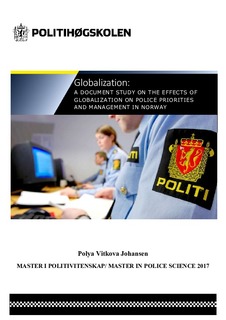| dc.description.abstract | As a society, we are bombarded every day by news from all over the world, which inform us about terror threats, illegal immigrants, refugees and asylum seeker and various types of cybercrime. The police are often criticized for not being prepared enough and able to respond adequately to these threats. As a public institution, the Police produces annual reports and these are often scrutinized and criticized. However, result do not just happen, they are a consequence of planning and prioritizing. Thus, one cannot expect the Police to deliver on an area of crime if they are not asked to prioritize it first. This spiked my interest in looking at the “orders” the police get and see if they change accordingly.
This study examines the way globalization affects police management and priorities. This is achieved by a document study of central governing documents for the Police for the period 2000 – 2010. The analysis looks at three sets of documents: the circulars that the Director of Public Prosecutions (DPP) that instructs the Police and the Regional Public Prosecution Authorities (PPO) on how to handle criminal cases and which targets and priorities to select; the general instructions to the police districts by the Police Directorate on what to prioritize; and the district specific instructions for Oslo police district.
The analysis shows that there is a change in this period that can be attributed to globalization. These changes can be divided into two groups: changes in how the police is organised and managed and changes in what types of crime the Police prioritize. There are three major changes in the organization of the Police: 1) The police district are reduced from 54 to 27; 2) The Police Directorate was established in 2002 as a result of the spreading of New Public management (NPM) and the need to a body to coordinate international police cooperation; 3) The Norwegian Immigration Police Services (NIPS) were established as a result of the changed nature of police work and the increased need for dedicated authority to deal with asylum seeker registrations and deportations.
The second group that I have identified is changes in what the Police are asked to prioritize. Crime types that can be related to the increased migration and technological development become an inseparable part of the priorities. Among those we find racially motivated crimes, international crimes, human trafficking, illegal work and others. Though I view these changes as attributed to globalization, there is no one to one cause-result relation to these and understanding them is much more complex than the scope of this project. | nb_NO |
